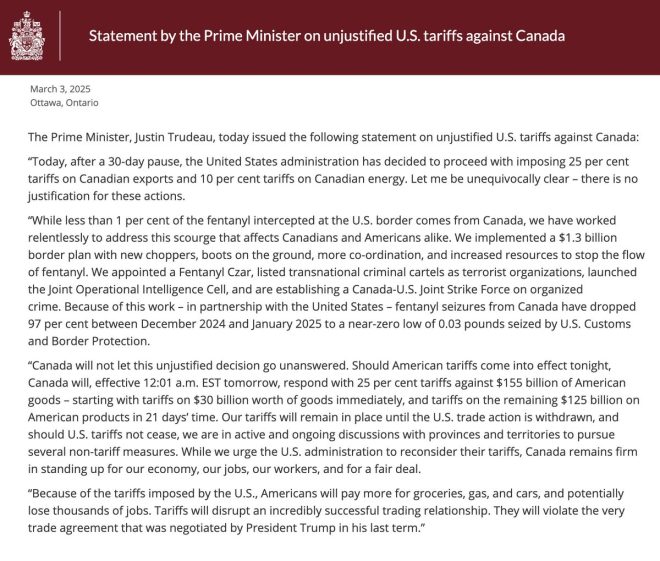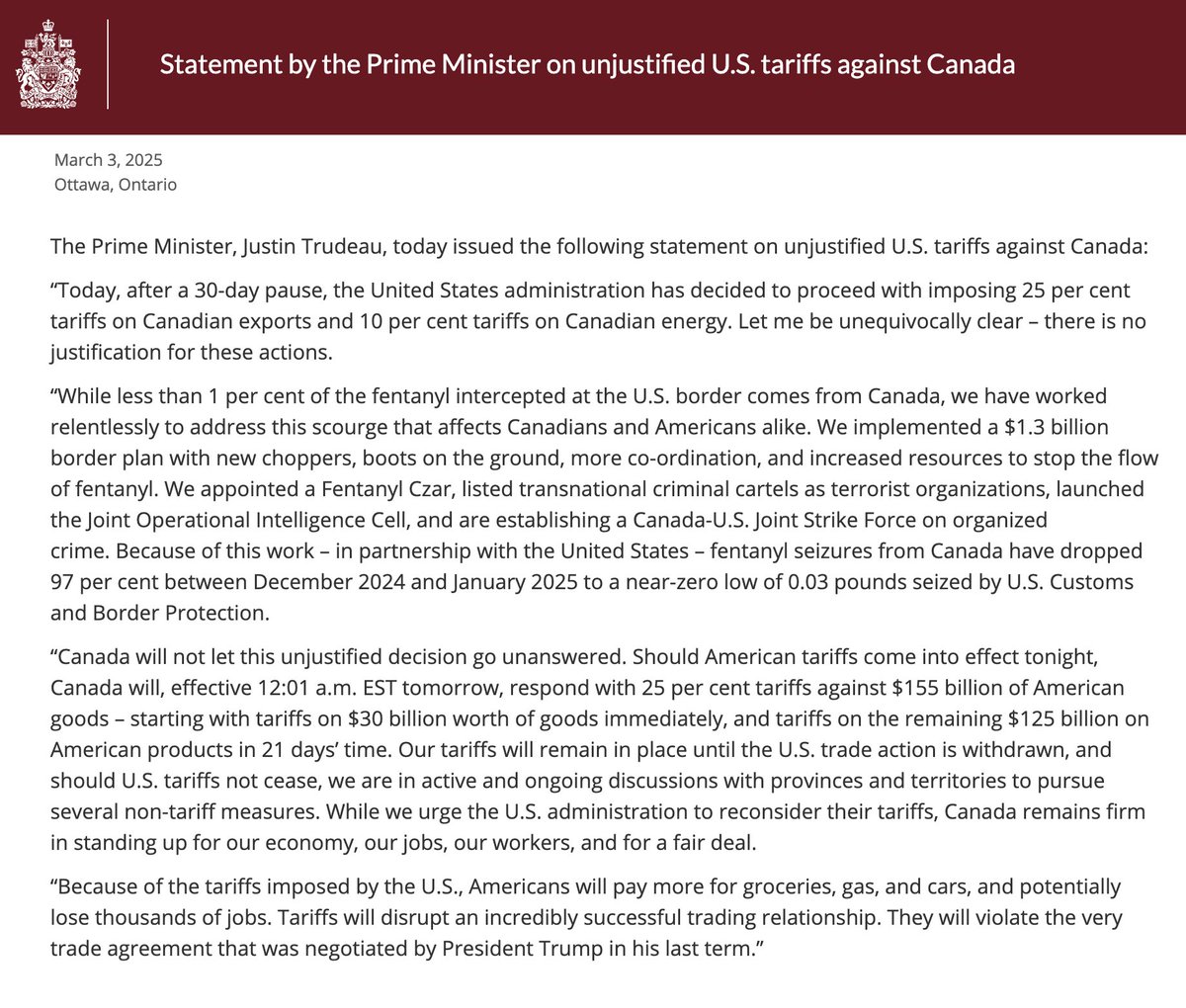
Summary of Trudeau’s Response to Trump’s Tariffs
In a recent statement, Canadian Prime Minister Justin Trudeau has publicly condemned the U.S. government’s decision to impose unjustified tariffs of 25% on Canadian goods. This move has significant implications for trade relations between Canada and the United States, two countries that have historically maintained a strong economic partnership. Trudeau’s response highlights the contentious nature of international trade and the potential repercussions of unilateral tariff actions.
The Context of Tariffs
Tariffs are taxes imposed by a government on imported goods, often used to protect domestic industries and generate revenue. However, they can also lead to trade wars, escalating tensions between nations. The current situation arose when the Trump administration announced these tariffs, which Trudeau described as "unjustified." The Canadian Prime Minister’s condemnation reflects a broader concern about protectionist policies that can disrupt global trade systems.
Retaliation by Canada
In retaliation to the U.S. tariffs, Trudeau announced that Canada would impose its own tariffs on $155 billion worth of American goods. This decision indicates a strong stance by the Canadian government, emphasizing that it will defend its economic interests. The retaliatory tariffs are set to take effect at 12:01 AM EST, should the U.S. proceed with its initial tariff plans. This move underlines the seriousness of the situation and the potential for escalating trade tensions between the two countries.
Economic Implications
The imposition of tariffs can have far-reaching economic implications, not only for the countries directly involved but also for global markets. Canada and the U.S. share one of the largest trading relationships in the world, with billions of dollars in goods exchanged annually. Disruptions caused by tariffs can lead to increased costs for consumers, reduced sales for businesses, and potential job losses in affected industries.
- YOU MAY ALSO LIKE TO WATCH THIS TRENDING STORY ON YOUTUBE. Waverly Hills Hospital's Horror Story: The Most Haunted Room 502
Furthermore, retaliatory tariffs can affect various sectors, from agriculture to manufacturing. For instance, Canadian farmers who export crops to the U.S. may find their products subject to higher costs, making them less competitive in the American market. Similarly, U.S. manufacturers who rely on Canadian materials may face increased expenses, which could ultimately lead to higher prices for American consumers.
The Political Landscape
Trudeau’s condemnation of the tariffs also reflects the political landscape surrounding trade negotiations. The relationship between Canada and the U.S. has been shaped by various trade agreements, including NAFTA and its successor, the USMCA. These agreements are designed to facilitate trade and reduce barriers, so unilateral tariff actions can undermine years of diplomatic efforts.
The timing of Trudeau’s announcement also coincides with broader political dynamics in the U.S. The Trump administration’s focus on "America First" policies has led to increased tensions with multiple trade partners. Trudeau’s swift response signals Canada’s commitment to maintaining a fair trading environment and protecting its national interests.
Public Reaction
The announcement has sparked various reactions from the public and political analysts. Many Canadians have expressed support for Trudeau’s approach, viewing it as a necessary measure to counteract unjust tariffs. Conversely, some U.S. analysts have criticized the administration’s tariff strategy, arguing that it could backfire and harm American consumers and businesses.
The situation underscores the complexities of international trade, where decisions made by one country can have ripple effects across the globe. As both nations prepare for potential escalations, the focus will remain on negotiating a resolution that addresses the concerns of both parties.
Looking Ahead
As the deadline for the implementation of Canadian tariffs approaches, the international community watches closely. The outcome of this trade dispute could set a precedent for future interactions between the U.S. and its trading partners. Both Trudeau and Trump face pressure to navigate these tensions carefully, balancing national interests with the need for cooperative trade relations.
In conclusion, the recent statement by Prime Minister Justin Trudeau condemning the U.S. tariffs reflects a significant moment in Canadian-American trade relations. With retaliatory tariffs poised to take effect, the potential for escalating tensions looms large. As both nations grapple with the implications of these tariff actions, the global economic landscape remains uncertain, highlighting the importance of diplomacy and negotiation in resolving trade disputes.

Canadian Prime Minister Justin Trudeau condemns Trump’s ‘unjustified’ 25% tariffs and says retaliatory tariffs on $155 billion of American goods will take effect at 12:01 AM EST if the U.S. moves forward tonight. pic.twitter.com/UsC5kBVIGX
— MeidasTouch (@MeidasTouch) March 4, 2025
Canadian Prime Minister Justin Trudeau Condemns Trump’s ‘Unjustified’ 25% Tariffs
In a bold move that has captured the attention of both Canadian and American citizens, Canadian Prime Minister Justin Trudeau condemned Trump’s ‘unjustified’ 25% tariffs. The tariffs, which have been a point of contention between the two neighboring countries, have sparked a heated debate about trade policies and their implications on the economy. Trudeau’s statement was not just a mere political stance; it was a clear indication of how seriously Canada views the potential economic fallout from these tariffs.
Retaliatory Tariffs on $155 Billion of American Goods
The stakes have been raised significantly, with Trudeau announcing that if the United States moves forward with the tariffs, Canada will implement retaliatory tariffs on $155 billion of American goods. This move is designed to protect Canadian interests and counterbalance what Trudeau describes as an unfair trade practice. Starting at 12:01 AM EST, these retaliatory tariffs could potentially affect a wide array of products imported from the U.S., making a significant impact on American exporters.
The Economic Context Behind the Tariffs
Understanding the economic context behind these tariffs is essential. Tariffs have long been used as a tool in international trade, often intended to protect domestic industries from foreign competition. However, they can also lead to increased prices for consumers and strained relations between countries. Trudeau’s condemnation of the tariffs reflects a growing concern among economists that such measures may lead to a trade war, the consequences of which could be detrimental to both economies. The ongoing adjustments in global trade dynamics mean that countries are increasingly wary of unilateral trade decisions that may disrupt established agreements.
Impact on Canadian and American Consumers
As these tariffs loom, the implications for consumers on both sides of the border are significant. Canadian consumers may face higher prices on American goods, which could lead to a decrease in purchasing power. Conversely, American producers could find themselves at a disadvantage in the Canadian market due to the retaliatory tariffs imposed by Trudeau’s government. This could result in a cascading effect on jobs, investments, and overall economic growth in both nations.
The Political Ramifications
Trudeau’s strong condemnation of the tariffs also has political ramifications. By taking a stand against what he sees as unjustified measures, Trudeau is not only protecting Canadian interests but also solidifying his position as a leader who prioritizes economic stability and fairness in international relations. This stance could resonate well with Canadian voters, particularly those who are concerned about the economic implications of trade wars.
Public Reaction and Future Outlook
The public reaction to Trudeau’s announcement has been mixed. Some Canadians applaud his decisive action, believing that standing up to the U.S. is a necessary move to safeguard their economy. Others, however, express concern about the potential for escalating tensions and the uncertainty it brings. Many are now watching closely to see how the U.S. will respond to Trudeau’s threats of retaliatory tariffs and whether this will lead to a diplomatic resolution or further conflict.
International Trade Relations Moving Forward
As the situation develops, it’s crucial for both governments to engage in dialogue to resolve these issues amicably. Trade agreements are the backbone of economic cooperation between nations, and maintaining those relationships is vital for long-term prosperity. Trudeau’s condemnation and the potential for retaliatory tariffs serve as a reminder that international trade is not just about economics; it’s also about relationships, trust, and mutual respect.
Conclusion
In light of the ongoing tensions surrounding the tariffs, it’s clear that both Canadian and American leaders need to prioritize communication and compromise. As we move forward, the impact of these tariffs will continue to unfold, and it remains to be seen how both nations will navigate this challenging landscape. With Trudeau’s firm stance against Trump’s tariffs, the focus will be on finding a path that promotes fair trade and economic stability for both countries.
“`
This article provides a comprehensive overview of the situation surrounding the tariffs and includes relevant keywords while ensuring a conversational and engaging tone.
